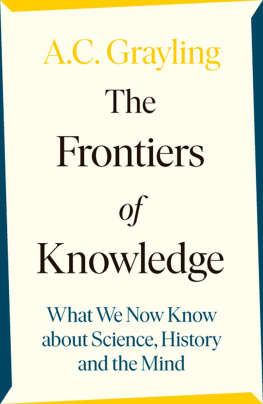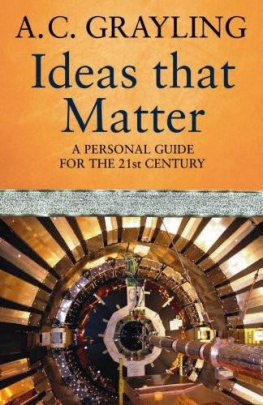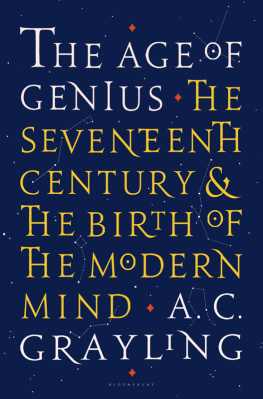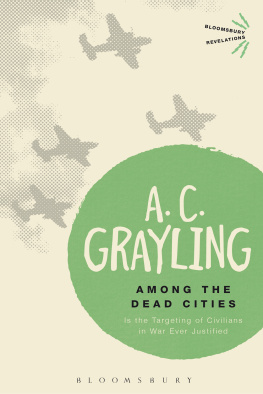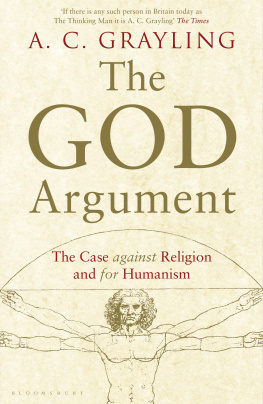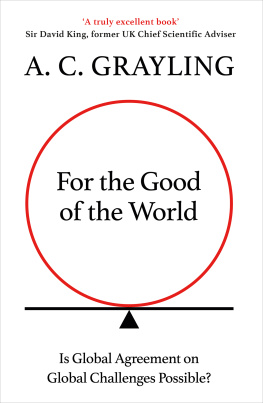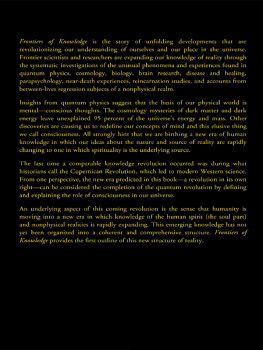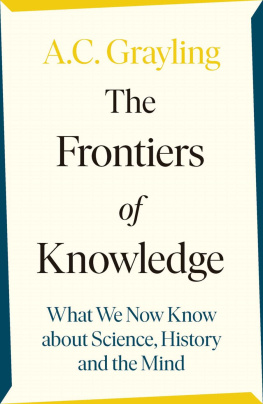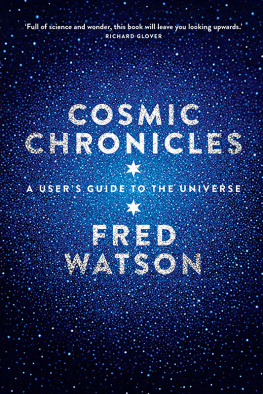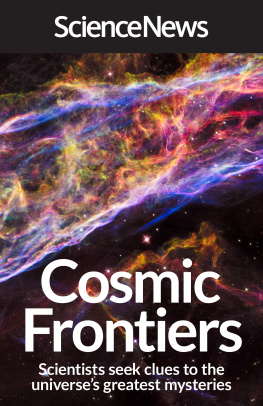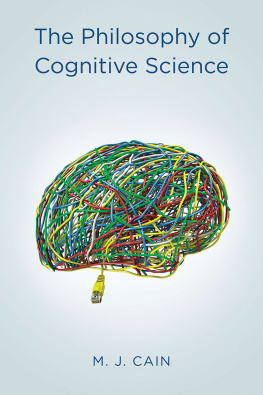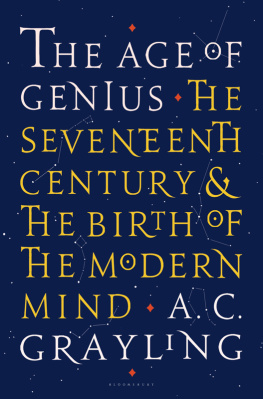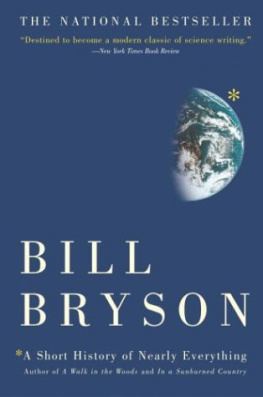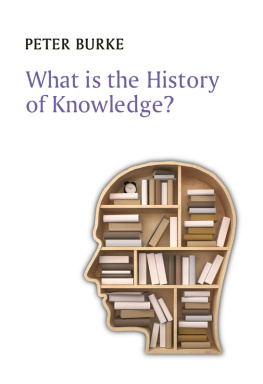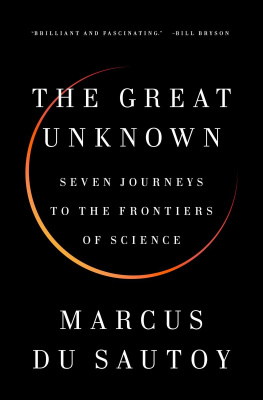
A. C. Grayling
THE FRONTIERS OF KNOWLEDGE
What We Now Know about Science, History and the Mind

Contents
About the Author
Professor A. C. Grayling is Master of the New College of the Humanities and a Supernumerary Fellow of St Annes College, Oxford. He has written and edited over thirty books on a wide variety of topics, including philosophy, science and the mind. For several years he wrote columns for the Guardian newspaper and The Times and in 2014 was the chairman of the Man Booker Prize.
To the founding students, faculty and staff of NCH and to all who carry its legacy forward:
Animi Cultura Gaudere
Figures
Ancient History
The Standard Model of Elementary Particles
Human Evolution
The Brain
Preface
In very recent times humanity has learned a vast amount about the universe, the past, and itself. Since the nineteenth century it has unearthed thousands of years of history forgotten or wholly unknown beforehand: the history of the great pre-classical civilizations, and before that the story of human evolution. Since the beginning of the twentieth century it has made hitherto inconceivable discoveries about the physical universe at the smallest and largest scales we can so far reach, from quantum theory to cosmology and the origins of space and time. And in just the past few decades it has been able to look inside the brain to begin finer-grained mapping of its structures and to observe them actually at work.
These advances have been enormous, exhilarating, and consequential. We occupy a different and much richer universe than our forebears living as recently as the nineteenth century. Yet a remarkable fact attends these developments: whereas it was once believed that every advance in knowledge diminishes our ignorance, these recent giant strides have shown us just how little we know. Enquiry thus generates a paradox: increasing knowledge increases our ignorance. So what do we know? And what do we now know that we do not know? And what have we learned about the nature of enquiry itself the barriers and difficulties that have to be overcome or taken into account as our increasing knowledge increases our ignorance?
This book seeks to answer these questions in three crucial areas at the frontiers of knowledge, these being science, history, and psychology more particularly: fundamental physics and cosmology, the discovery of the pre-classical past and human evolution, and the new neurosciences of brain and mind.
In writing often and variously about the growth of ideas and the history of philosophy, I have been deeply intrigued by questions about humanitys labours on the frontiers of knowledge, and about the nature, methods and problems of enquiry. These are questions that lie at the heart of philosophy understood in its broadest sense as reflection on what we know, how we know it, and why it matters because they lie at the heart of human endeavour itself. My aim in these pages is to illustrate and explore three of the most important frontiers of this endeavour, to describe where they lay and how they were advanced to where they lie now; and to discuss what their current position teaches us about what we have yet to learn.
A. C. Grayling
New College of the Humanities
London, 2021
Acknowledgements
I have learned much over many years from friends and colleagues, too many for all of them to be listed, but some merit particular mention for conversations and their writings over the years: Tejinder Virdee and Lawrence Krauss on physics and the universe, Adam Zeman, Daniel Dennett, and Patricia Churchland on the brain, mind and consciousness, Richard Dawkins on evolution, Steven Pinker on Enlightenment and the progress of ideas, Simon Blackburn, Peter Singer, and Alex Orenstein on philosophical dimensions. My thanks go also to Dr Ron Witton for comment on the History Wars, to Caroline Williams and Dr John Gribbin for advice on technical points, to Daniel Crewe my perceptive and knowledgeable editor at Viking, to Mollie Charge for her bibliographical researches, and to my colleagues at the New College of the Humanities for the variety and insight of our Ottoline Club faculty seminars.
Introduction
What do we know about the world, the past, and ourselves? Very recently, just in the course of the last century and a half, there have been spectacular advances in our enquiries into these topics. Using the most general labels for them, we call them science, history, and psychology respectively, but the labels do little justice to what has been achieved in them, nor what the achievements mean, nor where they are or might be leading us. They are the result of rapidly evolving technologies of enquiry that have vastly extended humanitys observational reach, both backwards in time and across previously inaccessible scales of distance from the remotest galaxies to the intricacies of the human brain, and yet further down to the inner architecture of the atom. Each step in these advances has in its turn raised new questions, questions that beforehand were not possible to ask; and one of the chief results has been to expose a paradox: the paradox of knowledge, which is that the more we know, the more we realize the extent of our ignorance, not least in these three crucial areas of enquiry about the world, the past and the mind.
The paradox of knowledge has been made familiar by these recent advances of knowledge, but until they became so rapid and far-reaching the belief was that knowledge was reducing the domain of ignorance. Humankind believed that knowledge was accumulating in such a way that the prospect of reaching the frontier of knowledge itself, enabling humankind to know everything there is to know, seemed to be implicit in the unfolding success of enquiry. The dramatic reversal in this perspective is no longer a surprise, but the implications of this fact, including those that raise questions about the nature of enquiry itself, have yet to be fully grasped.
Every stage in the growth of knowledge over the course of human history has had its frontiers, and for the pioneers venturing across them the frontiers defined the terra incognita that lay on their other side. Quite often the direction of travel they seemed to indicate turned out to be wrong. One of the greatest questions therefore about todays frontiers is whether the directions of travel they indicate are the right ones. Of course the proper response is: who can say until you try? But it might be that there are some clues both in the history of past frontiers and in the approach to present frontiers that could help.
As it happens, in an importantly different sense of the word knowledge, our ancestors have known a great deal not just for thousands but for millions of years. It appears that the earliest stone tools date to 3.3 million years ago, halfway back to the point in evolutionary history when the ancestral trees of chimpanzee and human forebears diverge. The knowledge they had is knowledge how that is, practical knowledge, from making tools to building shelters, mastering fire, creating cave art, domesticating animals and plants, shaping and moving huge stones, digging irrigation canals, fashioning textiles and pottery, casting bronze from copper and tin, smelting iron, and so onwards to the advanced technologies of today.
Next page
